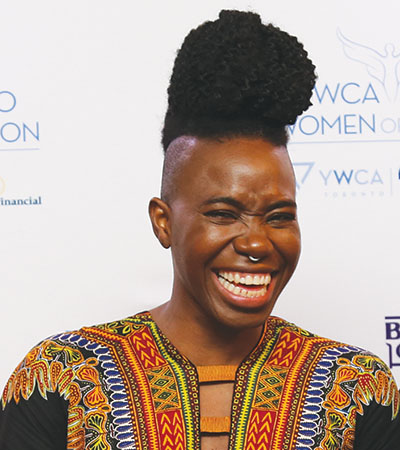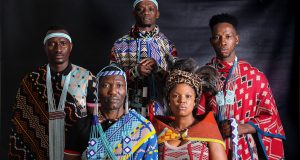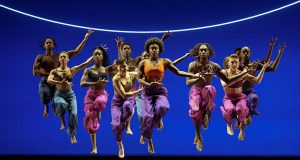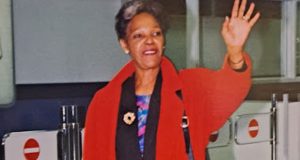A Review
By Neil Armstrong
PRIDE Contributing Writer
TORONTO, Ontario May 10 — Two enterprising black women of Jamaican descent/heritage, who are creating innovative waves in entertainment, have dramatic productions on, right now, at theatres in Toronto.
Trey Anthony, writer, producer and director of the award-winning “da kink in my hair” has a new play, “How Black Mothers Say I Love,” at the Factory Theatre, running from May 5-15, and d’bi.young anitafrika, dubpoet, playwright-monodramatist and arts educator, has “She Mami Wata & The Pussy Witchhunt” at Theatre Passe Muraille’s Backspace from May 4 to 22.
They are friends and the printed programs for their plays support each other’s work.
“How Black Mothers Say I Love”, which took Anthony six years to create, could easily be summed up by the Jamaican love song, “Fi Mi Love Have Lion Heart.”
It tells the story of a mother, Daphne, played by the veteran actor, Ordena Thompson, who left her daughters – Valerie (Allison Edwards-Crewe) and Claudette (Robinne Fanfair) — in Jamaica to seek a better life for them.
They reunite with their mother in Canada with her husband and their new sister, Cloe (Jewelle Blackman).
What Anthony taps into is the misunderstandings and strained relationships that result from a mother leaving children behind to seek opportunities, with the ultimate aim being the betterment of the family unit.
This is not necessarily how the kids interpret this dramatic shift/change in their lives.
“I come from a legacy of black mothers who have left their children. My grandmother left her children in Jamaica and went to England and was separated from them for six years. My paternal grandmother also left her children in search of a better life. Both of my grandmothers were poor women, mothering in less than ideal situations. The legacy of mothers leaving continued when my own mother left us in England in search of the Canadian dream. I was left behind…,” writes Anthony in the play’s director/playwright notes.
Elsewhere in the printed program, she gives a backdrop to the play of the West Indian Domestic Scheme, from 1955-1965, which saw many women, between the ages of 18-35, coming to work in Canadian homes from the Caribbean, mainly Jamaica and Barbados.
Many children and spouses later came to be reunited with the women when Canada’s immigration changed and made it possible to do so.
Through the dialogue of Daphne, Claudette and Valerie, the playwright introduces us to the reasons decisions are made, feelings resulting from those decisions, fissures created over a long time in familial relationships and the notion that love is most times demonstrated (in actions) than in what is spoken ( being told “I love you” by your mother).
Anthony said when her 80-year-old grandmother was diagnosed with terminal cancer, she “seemed compelled to finally talk about her past”, about why she chose to leave Jamaica. Anthony asked her if she had any regrets.
Her grandmother replied: “My biggest regret was leaving my children, they have never forgiven me, especially your mother. Sometimes as a mother you have to do what is best for your children. But they will never understand.”
Though it deals with this particular Jamaican family, the story has a universal appeal in exploring the complications that result from migration and reunification.
Like “She Mami Wata & The Pussy Witchhunt,” the church plays a major role in “How Black Mothers Say I Love You.”
Daphne has cancer and is prepared to meet her maker. She has stopped taking her medication and relies on church and prayer groups for solace.
Anthony accurately captures the dissonance between the bible-believing mother and her living-my-truth daughters – one in a marriage that is in trouble and leading to a divorce from her husband, the other, a lesbian who just broke up with her partner and wants her mother to acknowledge her sexual orientation.

A real-life marriage proposal, involving Trey Anthony’s sister and her partner (guy whose back is to the camera) of North Carolina, was made, on stage, at “How Black Mothers Say I Love You”. Photo credit: Neil Armstrong.
The playwright shines a light on the angst of the relationships and surprises us at the end, with the depth of love a mother has for her child/children, even when there are differences that divide and might sever ties temporarily at times.
The reference to the loyalty of the biblical characters of Ruth and Naomi is apt.
While Anthony’s play gives a snapshot of what happens inside church during a worship service, anitafrika’s starts outside the doors of the theatre, on the street, with a Revivalist/Pentecostal-style worship at the Church of the Righteous that leads patrons inside.
Anitafrika notes that, “She Mami Wata & The Pussy Witchhunt: The Orisha Trilogy Part 2 is a continued exploration of the Orishas, womxnhood/genders, spiritualities and sexualities as Black diasporised people in the 21st century. Journeying across the Atlantic Ocean in Esu Crossing The Middle Passage, then arriving in Jamaica (in both the dancehall and the church), bearing witness to the unapologetic womxnisms and misogynies, queerness and homophobias, liberations and repressions, the trilogy continues to investigate divinity, activism and Black people’s lived humanities through ongoing colonization.”
The playwright says: “Mami Wata emerges out of ancient African spiritual traditions (spread across the entire continent) that honour a diverse pantheon of womxn water-spirits and deities.”
“Mother Water is often the translation cited for their name. Mami Wata lives in all bodies of water and embodies the complexity and multiplicity of water itself. Without water there is no life and with water comes storms, hurricanes, floods and tsunamis. Mami Wata possesses the most enchanting beauty and shares characteristics with Yoruba-Ifa Orishas Ochun (river goddxss of childbirth and erotic love), Yemoja (mother goddxss of the sea), and Oya (goddxss who defends and protects womxn). She often has a snake nearby.”
As a monodramatist, anitafika plays all the characters, except for Amina Alfred, music director, composer and musician, who plays multiple roles here as well.

d’bi.young anitafrika seen when she received a Woman of Distinction Award from the YWCA, on May 27, last year. Photo courtesy of YWCA Canada.
Antiafrika has an ease with which she switches from one character to the other – pastor, old woman, child, burlesque dancer – and uses her voice to powerfully move the tone and sequence of the action/changes.
The play “centres on gender, sexuality, and the erotic through the life of three friends – Nicki, Michael and Kizzy – growing up in present-day Jamaica, who are challenged to re-negotiate their complex relationship under revised ‘anti-buggery’ laws.
Raised in the violence and silence of misogyny and homophobia, Nicki lives on the margins of church, the burlesque-pole and womxn’s thighs. As the play unfolds we learn that Nicki is not the only one living on clouds and in shadows.
Owen Blakka Ellis, who taught anitafrika drama when she was 11 years old in Kingston, Jamaica, is the director of the play.
“d’bi pushes and pulls with this strident, evocative work. The activist pushes provocatively against the grain and the artist pulls passionately on the strings of our hearts, breaking down the facile fences at the intersection of courage and caution, to create an electric space for compassionate contention and candid conversation which involves addressing some hard, hard questions. Yes, expect all of that packaged into tantalizing theatre because, well…that’s what d’bi does,” says the director in his notes.
He says “this play — the middle point in an enthralling trilogy – demands daring occupation of that space between notions of the sacred and profane.”
Anitafrika is not afraid to question/challenge the strictures that colonized people inherit and follow to dare to showcase new perspectives on the human condition. She does that flawlessly in this.
“How Black Mothers Say I Love You” closes on May 15 and Anthony says there are some tickets still available for May 10 and 11.
“She Mami Wata & The Pussy Witchhunt” runs until May 15 and on Wednesday there will be some PWYC (pay what you can) tickets available at the door.
Anthony dedicates the play to the memory of Daphne Dennie, Maud Enid Coley, and her mother (Claudette) Angela Senior.
Both plays are definitely worth checking out and kudos to Trey Anthony & Girls in Bow Ties and The Watah Theatre and all the creative people involved in making both productions a reality.
 Pride News Canada's Leader In African Canadian & Caribbean News, Views & Lifestyle
Pride News Canada's Leader In African Canadian & Caribbean News, Views & Lifestyle





